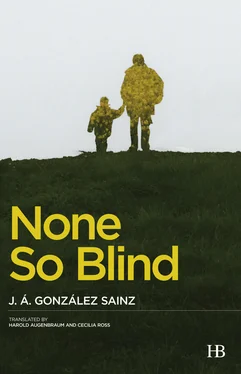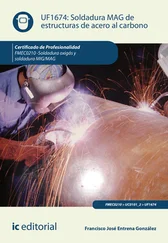Without a doubt, now it was she who called the shots in the house, and a lot of the time it was a pleasure to listen to what she had to say; it was as if she had come out of her shell, as if she had bid goodbye to all prior inhibition or shyness, to all timidity, and she even gave the impression of having studied, or at least of having learned, a never-ending grab bag of words and phrases which she would spit out in rapid fire with an astonishing degree of self-assurance that never ceased to amaze him. She would speak more and more frequently, just as their elder son did, for that matter, about all the attacks — or actions, which is the way their son would put it — against people whose human dignity, he’d noted, they always seemed, though he could never figure out or understand why, to have negated from the outset, with a feeling of rancor and malevolence that was incomprehensible to him despite the explanations both of them insisted on giving him. It seems to me that neither of you has any idea what you’re talking about, he would sometimes shrug, eventually lowering his head before beating a slow retreat so as not to have to go on with these disputes that struck him as falling on deaf ears, on deaf ears, he would say, with people who have decided on principle that they don’t want to understand.
So it seemed like he was the only one who was having a hard time getting fully acclimated or integrated, as his wife and elder son would say. It wasn’t for lack of trying, it’s true, and he gave everything he had to convince himself that it had all been for the best, that it was plain they had prospered in an endless variety of ways — you had only to look at his wife — or at least that there had really been no alternative. On Saturdays, and often on Sundays, when Asun would go out with her friends, he would head to a bar on the ground floor of one of the six identical apartment buildings where they lived — the second one on the side nearest the highway, if you were coming from the factory — and there, for better or worse, he would pass the time playing cards with a group of his neighbors. But after a few years, the bar’s ownership changed, and along with the change in ownership, there was a change in patronage, and several of his friends, those who like him had come from elsewhere as well as locals, gradually stopped coming. You just don’t get it, they would say to him.
The walls of the bar started filling up with flags, photographs of people he didn’t recognize, notices for one meeting or another, and slogans similar to the ones crammed and overlapping on the wall of the long hangar he went by, feeling confused and helpless, every day on the way to work. Even the coffee, which was practically the only thing he drank, had changed. He now found it more acidic, and stronger, or maybe it was the milk or the way it was prepared, which, like everything else, seemed to have transformed there from one day to the next. We’ll see, he told himself.
But if at first it all seemed strange — the distant and at times almost contemptuous treatment, as if they had no desire to make the least effort to keep certain customers or it didn’t matter to them at all whether they came or stopped coming, or even if they suspected that what they really wanted was to get rid of them without a second thought (although he’d kept going — what the heck, after all, we’re just talking about a cup of coffee or a beer every once in a while, he would tell himself) — it seemed to him that in an instant, out of a clear, blue sky, they were willing to pay more attention to him. Both the waiter and the rest of the customers, whose sullen expressions he had pretended not to see before, now began to turn to him with sudden familiarity, making jokes about things or referring to facts he feigned knowing about despite the fact that, most of the time, he was actually in the dark, and the rest of the time, well, the truth was that he actually preferred not to know.
That was about the same time his son Juanjo left home. He had found work somewhere else, in France, his wife told him after he hadn’t seen him for a few days. It wasn’t out of the ordinary that whole days or sometimes even weeks would go by without seeing him, without having what one might call any real contact with him, like having lunch or dinner together, for example, or going out for a walk, but on that occasion, although he didn’t really know why, he had a funny feeling that this time was different.
“Work, what kind of work?” he asked his wife.
“Work. . what do I know, I don’t understand all this newfangled business,” she answered. “It was about time he went off on his own anyway.”
“Well if you don’t understand. .” he replied.
Juanjo was twenty-seven years old at that point, Felipe had just turned sixteen, and it was true that it really wasn’t too soon for him to leave home, but it seemed to him — and this is how he put it to himself — that for a long time, and it was hard to figure out an exact date, but in any case it was just a few years after they moved, he hadn’t had any jurisdiction when it came to his older boy. He had lost him, he had lost control of him long before he left home without feeling the slightest need to say anything to him about it.
One day, one of the last days he saw him stop by the house — it was a Saturday, and it had been a sparkling afternoon — he noticed that he was more self-absorbed and unsociable than usual, which was saying something; it seemed like he was weighed down by some burden — perhaps a romantic disappointment, he thought, or one of those impossible headaches that seem overwhelming to young people but that disappear as easily as a puff of smoke — that was eating away at his insides and he couldn’t take it any longer. He asked him what was going on, and he asked him, not without some trepidation, if he could help.
“How are you going to help me, you’re just a worthless fucking hayseed,” he spat at him in reply, “a worthless hayseed, and one of them, too.”
For a few seconds he was caught short, he was totally unable to react, whether this way or that, and at the end of those seconds, and doing his utmost to remain calm and not slap him in the face — which might be what he should in fact have done, he told himself later — he asked who, one of who.
“One of them, who do you think, one of those disgusting, pile-of-shit pieces of scum that don’t let us live and have kept us historically oppressed,” he rattled off without stopping for breath, glaring at him with an air of arrogant disdain and accusatory resentment he was unable, despite having gotten gradually used to it, to find much of an explanation for, as was the case with so many other things.
“What would you know about being oppressed, much less historically oppressed?” he heard himself answering suddenly under his breath, like someone who has let himself say something he knows is useless, something it would perhaps have been better to have let go unsaid.
And from that moment, from a simple what would you know that had come tumbling out of his mouth unbidden and a historically he’d repeated back without knowing how or why he’d done it but knowing it had been on purpose, free rein was given to the furious argument that, right from the start, he had been unable to make sense of or know how to frame, especially considering the person to whom he was speaking, or even to know how to extricate himself from, no matter how hard he had been trying, from the instant it had been set in motion, to do just that.
More than an argument, though, more than a proper dispute in which each party, no matter how combative they might feel, still sets up his reasons in opposition to the other person’s, his arguments and facts in opposition to the facts and arguments of the other person, what this was, in fact, from the very moment it erupted, was a mere unilateral outburst of hostility, a pure and simple demonstration of rivalry, of a need to project onto this rivalry a contradictory swarming of internal impulses and, in so doing, to find an easy outlet for them, a banal, substitutive escape valve, a categorical, prideful sublimation. It was also, in addition to all that, an increasingly wrathful, violent act of venting on his son’s part, by means of which, to the father’s increasingly afflicted and alarmed amazement, he continued to fling reproaches and shower blame on him, to toss out accusations and call him bitterly to account, as if he had spent more time than one could bear just waiting for the occasion to present itself, to be able to burst out, but never finding the right reason or moment to do so — the fault of his worthless fucking last name, he yelled, his worthless fucking hometown, his sheeplike submissiveness, and his revolting poverty, his old age, his spinelessness, his inactivity, all day long depressed and playing cards, the fault of his having been born precisely to whom he had been born and having a father who was an absolute nobody, a nothing, and an out-and-out fascist.
Читать дальше












